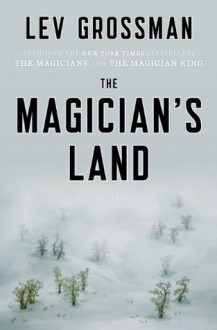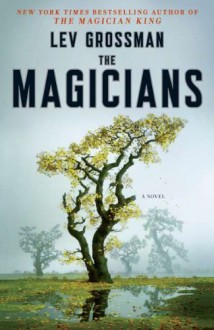

Wieder einmal steht Quentin Coldwater vor dem Nichts. Aus Fillory verbannt, ist er gezwungen, zur Erde zurückzukehren. Er muss sich ein neues Leben aufbauen, noch einmal von vorn anfangen. Fast von selbst lenken ihn seine Schritte zum Brakebills College für magische Erziehung. Der verlorene Sohn geht heim. Seine alte Schule empfängt ihn mit offenen Armen und langsam beginnt Quentin, sich in der irdischen Realität zu akklimatisieren. Er arbeitet hart und bleibt meist für sich. Doch seine Vergangenheit lässt ihm keine Ruhe. Noch immer quält ihn der Gedanke an Alice, seine große Liebe. Entschlossen, herauszufinden, was mit ihr geschehen ist und unterstützt von der begabten Schülerin Plum wagt sich Quentin in die zwielichtigen, gefährlichen Gefilde der Magie, in der Hoffnung, Alice vielleicht zurückzuholen.
Währenddessen spitzt sich die Lage in Fillory zu. Das verzauberte Land stirbt. Verzweifelt begeben sich Eliot und Janet auf eine letzte, alles entscheidende Quest, um ihr Königreich zu bewahren. Allein können die beiden allerdings wenig ausrichten. Sie brauchen Hilfe. Hilfe von dem einzigen Menschen, der mehr über Fillory weiß, als irgendjemand sonst: Quentin, dessen Schicksal untrennbar mit dem magischen Land verbunden zu sein scheint. Welten und Leben stehen auf dem Spiel. Wird Quentin Fillory retten können und endlich Vergebung für seine Sünden finden?
Das nenne ich mal einen Abschluss! Lev Grossman versteht es wirklich, eine Geschichte emotional befriedigend zu beenden. „The Magician’s Land“ ist meiner Meinung nach mit Abstand der beste Band der Trilogie „The Magicians“. Ich bin begeistert und war am Schluss sogar zu Tränen gerührt. Während all der Zeit, die ich mit dem Protagonisten Quentin in den Vorgängern „The Magicians“ und „The Magician King“ verbrachte, war ich enttäuscht von ihm, weil er einfach nicht zu schätzen wusste, welche Privilegien ihm zuteilwurden. Seine ziellose Rastlosigkeit faszinierte mich, entsetzte mich allerdings auch, da ich nicht verstand, was er denn eigentlich noch wollte. Er wusste es ja selbst nicht. Jetzt wird Quentin endlich erwachsen und schließt mit all den losen Enden in seinem Leben ab. Zum ersten Mal habe ich ihn als echten Magier wahrgenommen, der begreift, mit welchen Kräften er arbeitet. Aus Fillory rausgeworfen zu werden, war das Beste, das ihm passieren konnte. Andernfalls wäre er auf ewig der kindliche, naive Träumer geblieben, der sich stur weigerte, sich seiner Vergangenheit zu stellen. Er konnte dort nicht leben, er musste raus aus diesem zauberhaften, magischen Land, weil er es viel zu sehr brauchte. Er war zu abhängig davon, was ihn ausgerechnet mit Martin Chatwin verbindet, der ebenfalls nicht loslassen konnte und wollte, als es Zeit war. Martins zerstörerisches Schicksal, das Grossman in „The Magician’s Land“ erfreulicherweise noch einmal ausführlich beleuchtet, hätte ebenso gut Quentins Schicksal sein können. Er klammerte sich so fest an Fillory, dass er gar nicht merkte, dass es ihm irgendwann nicht mehr um das Königreich an sich ging. Es ging um ihn selbst, um seine egoistischen Empfindungen und Unzulänglichkeiten. Ich denke, das ist der Grund, warum jedes Kind, das Fillory besucht, nicht mehr eingeladen wird, sobald es beginnt, erwachsen zu werden. Das ist keine willkürliche Grausamkeit, wie Quentin behauptet, sondern ein Schutzmechanismus. In Fillory kann man nicht erwachsen werden. Das Land ist dafür nicht geschaffen. Es ist der Unschuld der Kindheit vorbehalten. Magie dieser Art verdirbt durch die Anwesenheit irdischer Erwachsener, was der Verlauf der Regentschaft von Eliot und Janet eindrucksvoll beweist. Obwohl sie Fillory niemals direkt schadeten, kann es kaum Zufall sein, dass ihr Königreich nur wenige Jahre (in der Zeitrechnung Fillorys) nach ihrer Machtübernahme im Sterben liegt. Es war nie vorgesehen, dass Erwachsene die Throne beanspruchen. So läuft das nicht. Ich bin fest überzeugt, dass Quentin Fillory gerade noch rechtzeitig verließ, um endlich die längst überfällige persönliche Entwicklung zu durchleben, die ihn paradoxerweise als den einzigen Menschen zeichnet, der Fillory retten könnte. Grossman beschreibt seine Entfaltung brillant, zeigt all ihre schmerzhaften, desillusionierenden Facetten extrem ehrlich und realistisch. Endlich ist er der Magier, der er immer sein wollte: er gebietet über die düsteren, unberechenbaren Mächte der Zauberei, indem er sich ihnen mit einer Mischung aus kindlicher, begeisterungsfähiger Neugier und erwachsenem Verantwortungsbewusstsein nähert. Ich bin unglaublich stolz auf ihn.
„The Magician’s Land“ vermittelt eine andere Atmosphäre als die vorangegangenen Bände der Trilogie. Diese ist zwar noch immer bedrohlich und verdreht, doch darunter liegt eine gewisse majestätische Ausgeglichenheit, die meiner Ansicht nach aus Quentin als Protagonist entspringt. Ich habe mich ihm so nahe gefühlt wie noch nie zuvor und mache mir keinerlei Sorgen um seine Zukunft. Er wird seinen Weg gehen. Ich bin sehr glücklich mit dem Finale dieser bizarren Geschichte, die über das Motiv des Zauberlehrlings weit hinauswächst und diesem eine Tiefe verleiht, die ich am Beginn von „The Magicians“ niemals erwartet hätte. Lev Grossman hat ein Epos erschaffen, das meinem Empfinden nach tatsächlich der würdige Nachfahre der „Chroniken von Narnia“ ist, wenn auch erwachsener, moderner und ernsthafter. Subtil stellt er sich der philosophischen Frage, ob Magie ein Vorrecht der Kindheit ist und ob der Verlust der Unschuld beim Erwachsenwerden den Verlust der Magie impliziert. Natürlich gibt es auf diese Frage keine einfache Antwort. Ihr werdet den verwirrenden Fall durchs Kaninchenloch gemeinsam mit Quentin selbst wagen müssen, um sie zu finden. Geht es nach mir, solltet ihr das unbedingt tun, denn gerade Bücherwürmer, die mit einer reichen Fantasie gesegnet sind, können durch die Trilogie viel über die Träume ihrer Kindheit lernen.

 Log in with Facebook
Log in with Facebook 










